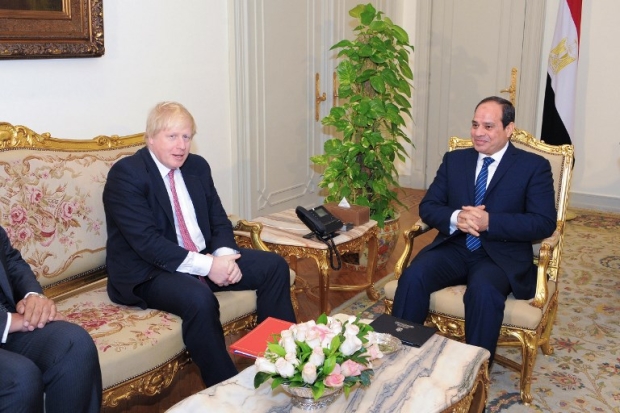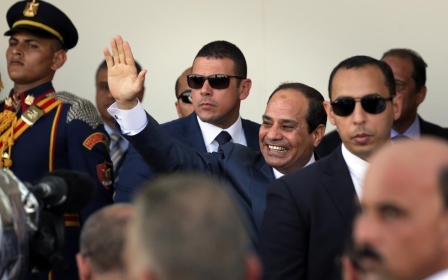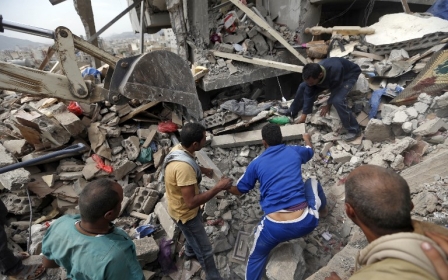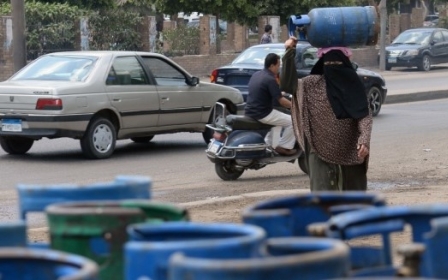Five years on: How the UK sees opportunity and profit in Sisi's repressive Egypt
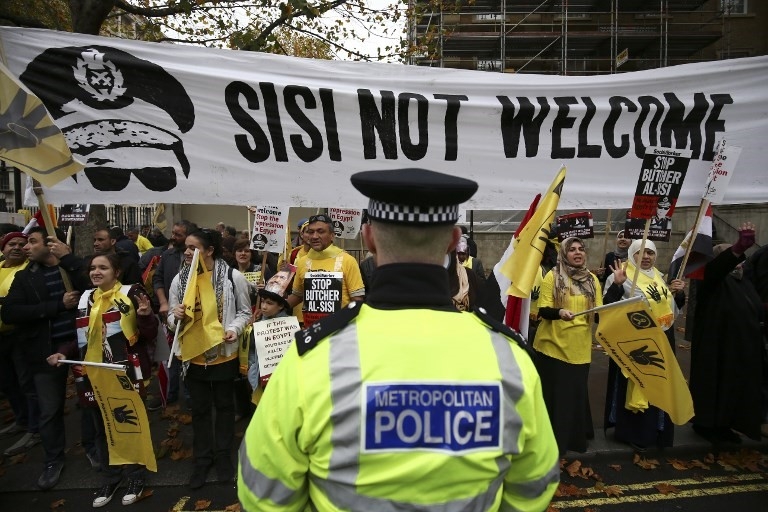
Five years ago on 14 August, the new Egyptian military regime under General Abdel Fattah el-Sisi crushed a protest at Rabaa al-Adawiya Square in Cairo, killing at least 817 people.
Since then, increasing repression has enabled Sisi to consolidate his rule while maintaining the support of his main Western backers, the US and UK. Britain's policy towards Egypt in the past five years has been remarkable, confirming that Whitehall not only turns a blind eye to, but often has a preference for, repressive systems that help advance its commercial interests in the Middle East.
Human Rights Watch observed that the Rabaa killings were "perhaps the largest mass killing of protesters on a single day in modern history, worse even than Tiananmen Square". Security forces used armoured cars, bulldozers and snipers to attack the makeshift camp and gun down protesters staging a sit-in in support of the ousted government of Mohamed Morsi, Egypt's first democratically elected president.
Since then torture, deaths in detention and restrictions on civil society and journalists have become common. A 2017 British government report noted that there were 60,000 political detainees in the Egypt.
Energy deals
For the British government, the repression has presented a new opportunity. Indeed it seems as though for Downing Street, the Wu-Tang Clan's anthem applies: cash rules everything around me.
In March 2015, British multinational oil giant BP signed a massive $12bn investment deal for an oil and gas project in the West Nile Delta. The agreement, the largest foreign direct investment in Egypt, enables BP to develop five trillion cubic feet of gas resources.
The deal was first announced in 2010 under the previous regime of Hosni Mubarak and was confirmed by the Morsi government after the 2011 revolution. However, BP was forced to put the project on hold after local residents mobilised against the plan to build a mega-gas plant next to their homes, blocking roads and occupying the building site.
At the same time, the Morsi government introduced an obstacle by objecting to BP's proposed terms that it should have direct ownership over the resources and accrue 100 percent of the profits. By mid-2013, just weeks before the coup, the Morsi government was engaged in talks with BP demanding better terms.
BP's project can also resume because of the Sisi regime's repression. The new anti-protest law threatens multi-year prison terms for street protests and has largely silenced many NGOs and opposition forces
Sisi's seizure of power changed everything. The new deal offers BP exceedingly generous terms and has moved Egypt away from a long-used production-sharing model, in which companies and countries typically split profits 20:80, to a tax royalty scheme that essentially hands control of natural resources to private companies.
BP's project can also resume because of the Sisi regime's repression. The new anti-protest law threatens multi-year prison terms for street protests and has largely silenced many NGOs and opposition forces, including those opposing the BP deal. Within a year of seizing power, Egypt's oil minister announced that BP's stalled project had restarted; production began in May 2017.
BP and the British state
BP is not just any investor in Egypt. It has projects in the North African country worth around $30bn. It basically controls the nation's energy supplies. BP produces close to 50 percent of Egypt’s natural gas consumption and, with the Egyptian General Petroleum Company, almost 40 percent of its oil production. BP and its partners operate across 55,000 square kilometres of the country - an area around the size of Croatia.
Neither is BP just another company. Rather, it has connections at the highest levels of the British state. On BP's board sits John Sawers, the former director of the Secret Intelligence Service (MI6), who took up his BP role in 2015 after serving as head of MI6 from 2009-14. Sawers also has strong links to Egypt, having served as British ambassador there from 2001 to 2003.
The UK has long been the largest investor in Egypt, but "we are hungry for more," the British ambassador in Cairo, John Casson, has said. In February, the British trade envoy to Egypt, Jeffrey Donaldson, arrived in Cairo, heading up the largest British trade delegation in nearly two decades, involving more than 50 companies.
May and Sisi
The scale of its commercial interests makes Britain probably the leading apologist for Sisi's regime. When Sisi won an "election" in April with 97 percent of the vote - a figure that would have impressed Soviet leaders - Theresa May "congratulated President Sisi on the chance to take Egypt further along the path of democratic transition". May's support is especially shocking, since Sisi ran virtually unchallenged after other candidates were arrested or pulled out, in a process where there were no public debates.
May's apologia for Sisi follows his visit to the UK in 2015 and a stream of recent high-level military visits. The British government said last month that "military cooperation between Egypt and the UK has increased significantly in recent years as the UK and Egypt work to deepen their cooperation in the face of the shared threat of terrorism". It has also announced that it hopes to train "hundreds" of Egyptian military officers in Britain.
These relations are with officers intimately involved in the overthrow of the Morsi government: Egypt’s new defence minister, Lieutenant General Mohamed Ahmed Zaki, personally arrested Morsi during the 2013 coup.
Whitehall is perfectly aware of the deteriorating human rights situation, but Casson has apparently convinced himself that Egyptians "are building a more stable, more prosperous and more democratic country". Casson has even been quoted in the Egyptian media approving of Egypt's "tough security measures". Peter Oborne notes that the British ambassador has never publicly complained about the murder of Egyptian citizens by the regime or about the torture and rape of political prisoners. What the diplomat does do, however, is stress that Britain is "Egypt's number one investment partner".
London says it has raised concerns about human rights in Egypt, but its policy doesn't change as a result. After the 2013 Rabaa massacre, the UK government revoked some arms export licences, but left larger licences in place; arms sales soon resumed at normal levels. Some £72m ($92m) in arms have been supplied by the UK in the past three years.
Impunity for Rabaa
The British government says it is "not aware of any Egyptian accountability processes relating to" the Rabaa massacre. Indeed, no security officers have been held accountable for the killings. Rather, last month, the Egyptian parliament provisionally approved legislation that exempts senior army officers from prosecution for acts committed in the period following the July 2013 military coup.
As elsewhere in the Middle East, we are witnessing British policies that are both unethical and go against the basic British - and Egyptian - public interest
Egyptian journalist Mohannad Sabry has noted that the Sisi regime, far from fighting terrorism, is "creating and sustaining a state of desperation and hopelessness, crushing the already dwindling belief that change can be accomplished through peaceful means, and leaving a vacuum for terrorist groups to fill". As elsewhere in the Middle East, we are witnessing British policies that are both unethical and go against the basic British - and Egyptian - public interest.
- Mark Curtis is a historian and analyst of UK foreign policy and international development and the author of six books, the latest being an updated edition of Secret Affairs: Britain's Collusion with Radical Islam.
The views expressed in this article belong to the author and do not necessarily reflect the editorial policy of Middle East Eye.
Photo: Protesters with flags showing the four finger symbol known as "Rabaa", which is associated with those killed in the crackdown on the Rabaa al-Adawiya protest camp in Cairo in 2013, demonstrating against the expected visit by Sisi outside Downing Street in central London on 5 November, 2015 (AFP)
New MEE newsletter: Jerusalem Dispatch
Sign up to get the latest insights and analysis on Israel-Palestine, alongside Turkey Unpacked and other MEE newsletters
Middle East Eye delivers independent and unrivalled coverage and analysis of the Middle East, North Africa and beyond. To learn more about republishing this content and the associated fees, please fill out this form. More about MEE can be found here.



